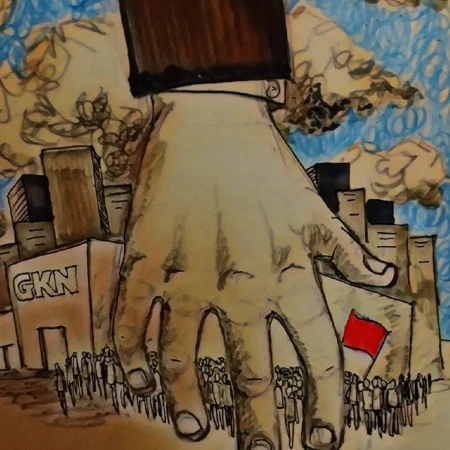On 9 July 2021, Melrose Industries announced the closure of its GKN Driveline (formerly FIAT) factory at Campi di Bisenzio, near Florence in Italy, which produced axles for cars. More than 400 workers were laid off. While in many such cases the workers and unions settle for negotiating enhanced redundancy benefits, the GKN Factory Collective took over the plant and kickstarted a long struggle against its closure.
But what makes the ex-GKN Florence dispute really unique is the strategy adopted by the workers, who sealed an alliance with the climate justice movement by drafting a conversion plan for sustainable, public transport and demanding its adoption.
This strategy engendered a cycle of broad mobilisations – repeatedly bringing tens of thousands to the streets – so that the dispute still continues, and the permanent sit-in at the factory remains until today.
The workers were meant to be finally dismissed on 1 January 2024. The GKN Factory Collective had thus turned New Year’s Eve into a final call to action to defend their conversion plan. Such pressure from below probably played a role in a decision by the labour court, announced on 27 December 2023, to overturn the layoffs for the second time.
The workers’ current plan is to set up a cooperative for the production of cargo bikes and solar panels, as part of a broader vision for a worker-led ecological transition. This needs material solidarity, now. A popular shareholding campaign has been started, to launch this co-operative: so far more than 600,000 euros have been collected, towards a target of one million euros.

All information on how to contribute, individually or as an organisation, can be found at the website Insorgiamo.org.
This interview with some GKN workers, by Luca Manes, was published in December on Comune-Info in Italy, and was translated into English by Lorenzo Feltrin.
At first sight, the ex-GKN dispute in Campi Bisenzio, near Florence, is related to a typical operation of financial speculation. A corporation, in this case Melrose Industries, buys a company, GKN, breaks it up, and fires hundreds of workers. GKN Florence used to produce car axles – and it was not at all in a terminal crisis when Melrose arrived: a common element with many comparable cases.
Nonetheless, this is also – and most importantly – an extraordinary story of resistance, which has luckily found a wide audience in the Italian media.
On 9 July 2021, the day when Melrose attempted to lay off all workers, the GKN Factory Collective took over the factory. The workers are still in control of the premises today. To better understand the perspective and motivations of the GKN Factory Collective, we met and interviewed some of its members. The result is the following interview, touching on key issues of their struggle, from the ecological transition to the transformation of production.
Q. What are the latest updates on your struggle?
On 18 October 2023, the company resumed the layoff procedures [which had been cancelled by a Labour Court]. We will thus be finally dismissed on 1 January 2024. [In the end, this did not happen, as the layoffs were overturned by a Labour Court for the second time on 27 December 2023].
We called it the “X hour”: the time when the factory is “liberated” from its workers, it stops being a manufacturing hub and a working-class community and it becomes a mere building, to be emptied out and sold on the real estate market. Potentially, there will be a real estate speculation following the financial one, a double social crime in an area that has just been hit by a flood, caused by climate change and by uncontrolled construction on what used to be green soil.
Q. Why is the GKN dispute a systemic struggle, and to what extent could it be replicated in other contexts, in other types of industries?
I don’t know whether the GKN struggle is against the system, but I know the system is against the GKN struggle. On 9 July 2021, we were simply working on the assembly line. It was them who took us away from there, sacking us. Rather than quibbling about our level of anti-capitalism, we should be talking about how much capitalism is anti-us.
There is a world that shut down this factory: overproduction, financialisation, the disengagement of Stellantis [the multinational motor manufacturer], a lack of state intervention, the complicity of politicians.
We just resisted. To resist one day or one month, you need to hold on. It was the external circumstances that pushed us to elaborate a re-industrialisation plan.
In order to do it, we had to start with the people who had defended the factory: the workers, the climate justice movement, the solidarity and convergence networks.
From a defensive position, we moved on to counterattack. It is not necessarily an experience that can be replicated, but it is certainly an exemplary one. Our plan is not anti-system in itself: one single factory cannot escape the market. Nonetheless our example is a nuisance to the system.
Q. What examples inspired your struggle in turn?
We studied comparable disputes from the past, recent and distant: Apollon in Rome 1969, Innse [whose industrial assets in Brescia were bought by the multinational Camozzi group in 2021], and so on. We have learned the lessons of the Rimaflow experience in Milan.

We have had to understand that we were in an “Argentinian” scenario: when the times of resistance in one single factory do not coincide with the general rise of a mass movement, we see the phenomenon of workers self-managing the factory recovery. So we reached back to the Argentinian “recuperated factories” movement.
There are both similarities and differences with all the cases I’ve just mentioned. A crucial one: we are not going back to making what this factory was originally producing. We had to – and in several respects wanted to – elaborate a plan for an ecological conversion.
Q. How could the GKN struggle contribute to the difficult task of ecological transition – which many people would like to see, but that in reality, setting aside all the greenwashing, is not really taking off?
Some technologies are “greener” than others. But no green technology can be implemented on a large scale without a social plan to transform the economy. This is a radical and urgent necessity. And there is no social planning without social control over production.
We have learned that the working-class capacity to resist, in order to defend its social rights, at some point also generates a capacity to know, to control, and to determine choices about how, what and how much to produce.
In its historical peaks, the labour movement produces radical, council democracy. Radical democracy comes with the capacity to enter into the substance of productive processes. Without this, the ecological transition is impossible – or unmanageable, which amounts to the same thing.
Q. Could the GKN struggle be a first step in the right direction? Could you find the strength to generate a virtuous circle around this issue?
As I said, we are not a model that can simply be replicated. One single factory can’t be a model. But we are an example. Tomorrow, this example could generate statements, pamphlets, and analyses, but also concrete projects.
For example, the production of cargo bikes under workers’ control, bikes that will be available to riders transforming the delivery industry, including its relationships to the urban environment. Photovoltaic panels at the service of energy communities, geared towards “democratising” energy production and distribution. Local governments and public institutions could be part of the cooperative and receive solar panels in return, and use them to eradicate energy poverty in their neighbourhoods.
There are many possibilities, some of them potentially contagious. I repeat, we reject any kind of idealisation of this process.
We are not theorising anything new, and we do not believe in oases of happiness within the desert of the market. But we hold that this is a great opportunity to say: it’s possible, it could be possible. If we miss this opportunity, what are we going to tell the workers of the next plant threatened with closure?
Q. What is the Factory Collective’s view about the fact that you did not manage to access public funds for the recovery of firms in crisis? What does the future hold in this respect?
The current political conjuncture is such that the public sector does not intervene without a partnership with the private sector. Public interventions are only at the service of private firms, often covering for their financial losses. And the private sector never intervenes with a public vision.
The product we want to make does not exist. In order to be brought into existence, it needs investment. But the private sector does not invest if the product does not exist, and the product does not exist without an investment in industrial machinery.
When it comes to green innovation, the market shows all its inertia and conservatism. This is why the ecological transition needs investment by a subject that considers the public good as one of its objectives.
We are currently in a vicious circle, and we have equipped ourselves to try and break it, with all means at our disposal. But even if we managed to fully break it, the issue of the factory remains.
From a financial point of view, we are talking about crumbs for the big public and private holdings. With a sum of between 10 and 50 million euros, we would end our dispute and give this country a hub for the production of public and sustainable energy and mobility. The resulting tax returns would repay the investment by far. We would have a foothold in the transition, tax income and jobs.
The truth is that this game is not about money, it’s about power. A multinational corporation must be able to close, open, break up, build, flee, sell, and humiliate communities. Reopening GKN, rather than a mere re-industrialisation, would be a crime of lèse majesté against such a power. 6 February 2024
Source >> People & Nature blog
□ Support GKN autoworkers’ just transition struggle: a GoFundMe appeal by the Trade Union Caucus of the Climate Justice coalition
□ “To our entire solidarity network: towards the zero hour”. A statement by the workers’ collective (People & Nature, December 2023)
□ A film by Reel News: “GKN factory occupation needs your help” (eight minutes)
Art (54) Book Review (127) Books (114) Capitalism (68) China (81) Climate Emergency (99) Conservative Government (90) Conservative Party (45) COVID-19 (45) EcoSocialism (59) Elections (83) Europe (46) Fascism (61) Film (49) Film Review (68) France (72) Gaza (62) History (42) Imperialism (100) Israel (129) Italy (46) Keir Starmer (56) Labour Party (114) Long Read (42) Marxism (50) Marxist Theory (48) Palestine (179) pandemic (78) Protest (154) Russia (341) Solidarity (146) Statement (49) Trade Unionism (142) Ukraine (349) United States of America (134) War (370)

